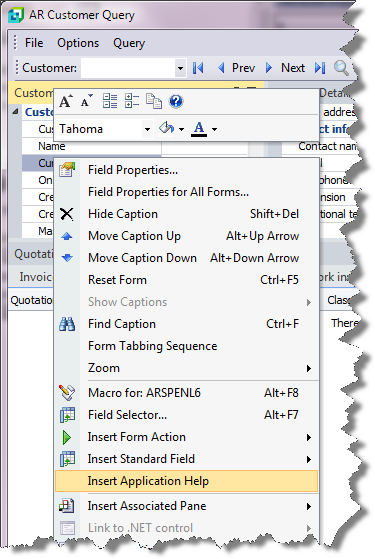You use this program to configure how you want to store your summary sales history information (configured by associating key area selections to a unique code).
The sequence in which you define the summary keys determines the order in which the summary sales history is stored and printed.
The number of codes you define determines the extent to which you are able to sequence and subtotal the Sales History report. You can define more than one summary code with the same set of summary keys (in the same order). This enables you to define different targets for the same set of data.
| Field | Description |
|---|---|
| Code |
Indicates the summary code you are currently maintaining. |
| Name | Describes the summary code. |
| Key area one |
Indicates the first key (index) that must be used for this code. It is the primary key (index) under which the sales analysis summary records will be stored. You can select one of the following options for this key: Salesperson, Branch, Order type, Customer class, Geographic area, Customer, Warehouse, Department, Product class or Blank. The stock code may only be assigned to Key area two. Therefore, if you want to use the stock code as the first (primary) key, you need to select Blank as the option for Key area one and Stock Code as the option for Key area two. |
| Key area two |
Indicates the second key (index) that must be used for this code. It is the secondary key for the sales analysis summary records, providing Blank was not selected as the key for key area one. You can select one of the following options for this key: Salesperson, Branch, Order type, Customer class, Geographic area, Customer, Warehouse, Department, Product class, Stock code or Blank. Only once a key is assigned to Key area one can you select a key from Key area two. If you selected Blank for Key area one, then you cannot select Blank for Key area two as well. |
| Key area three |
Indicates the third key (index) that must be used for this code. It is the third key for the sales analysis summary records. You can select one of the following options for this key: Salesperson, Branch, Order type, Customer class, Geographic area, Customer, Warehouse, Department or Product class. Only once a key is assigned to Key area two can you select a key from Key area 3. |
| Targets required for this summary |
Assigns targets to your summary keys using the Sales Target Maintenance program. |
-
You must enable the Retain summary sales history setup option in the Sales Analysis Setup program to generate summary keys.
-
If you need to rebuild your sales history summary file, then you must run the Recreate Sales History program with the Recreate history summary from archive option enabled.
You must rebuild your sales history summary file whenever you add or change the summary keys.
-
The availability of summary keys for selection is unaffected by any selections made within the Detailed key options section of the Sales Analysis Setup program.
Inserting Application Help
You would typically follow this procedure to display help for the current program in a customized pane that can be pinned to the program window.
Information includes step-by-step instructions for the various functions available within the program, including a brief overview of what the program does, what setup options are required and how to personalize the program.
-
Open the program for which you want to insert application help into a customized pane.
This functionality is only available for a program that has panes.
-
Right-click any form field.
You can also click the triangle menu icon that appears in the title area of a pane.
-
Select Insert Application Help from the context-sensitive menu.
The application help appears in a pane within your program. You can reposition the pane using the docking stickers or pin it to the program window.
Removing the Application Help pane
If you no longer want to display application help in a pane for your current program, you can simply remove it.
-
Select the Close icon in the right-hand corner of the application help pane.
-
Confirm that you want to delete the pane.

